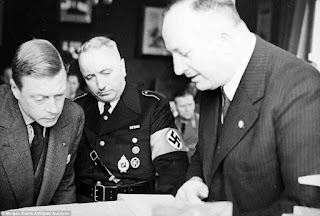Two scores for Nazi diplomacy
Amphibious
landings by Japanese troops on the Yangtse turned one flank of the defending
Chinese armies defending the line of the Beijing-Hankow railway and a pincer
movement turned the other. The Chinese broke completely and some 200,000
soldier fled. Many were drowned trying to escape by river-junk.
The latest German diplomatic move showed a degree of finesse not normally associated with the Nazi regime and it was all the more devastating for this. The Belgian government was given a formal declaration of Germany’s respect for the inviolability of its frontiers and a promise of support if Belgium were invaded. It set the seal on the Belgium’s drift away from France with whom it had formally abrogated its 1920 alliance the year before. It fed Belgian fantasies of remaining neutral in a war and removed any hope that Belgium would somehow help extend the Maginot Line to the north either in terms of physical fortification or mobile forces. Of course, when the day came in May 1940 Germany cheerfully ignored its commitments, but they had served their purpose.
The Duke and
Duchess of Windsor arrived in Germany for the start of a “private” visit
supposedly intended to inform the Duke about the conditions of working men in
Nazi Germany. This avowed goal was intended to capitalise on the Duke’s
well-founded reputation for sympathy with working people in Britain. This did
not succeed and the true purpose of the visit – to relaunch the Duke’s career
as a public figure – less than a year after his abdication was painfully obvious.
All the labour angle earned him was the dubious pleasure of having Robert Ley,
head of the Reich Labour Front, as his formal host. Ley was a drunkard given to
personally chauffeuring his guests around in a powerful limousine at insane
speeds.



Comments
Post a Comment